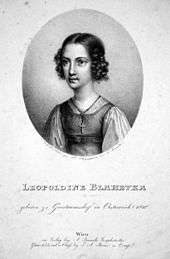Leopoldine Blahetka
Marie Leopoldine Blahetka (16 November 1809 – 17 January 1885) was an Austrian pianist and composer.

Life
Leopoldine Blahetka was born in Guntramsdorf near Vienna, the child of George and Barbara Joseph Blahetka Sophia, née Traeg. Her father was a history and mathematics teacher and her mother a physharmonica teacher and performer. Her maternal grandfather was the Viennese composer Andreas Traeg.[1]
The family moved to Vienna and George Blahetka took a job with the Traeg music publishing house. Leopoldine took piano lessons from her mother and made her debut as a pianist in 1818. Afterwards, she studied with Joseph Czerny, Hieronymus Payer, Eduard Freiherr von Lannoy, Joachim Hoffmann, Catherina Cibbini-Kozeluch, Friedrich Kalkbrenner, Ignaz Moscheles, and later composition with Simon Sechter.[2]
In 1821 Blahetka began touring Europe, accompanied by her mother, and continued to tour for about twenty years. In about 1830 the family moved to Boulogne-sur-Mer, France, seeking a better climate. Blahetka died in Boulogne-sur Mer.[3][4]
Works
Selected works include:
- op. 9, Grande polonaise concertante pour le piano forte et violoncello
- op. 13, Variations sur un thème favorite
- op. 14, Variations brillantes
- op. 15, Sonate for violin
- op. 16, Nr. 1, 6 Deutsche Lieder: Die Nebelbilder
- op. 16, Nr. 2, 6 Deutsche Lieder: Der Getröstete
- op. 16, Nr. 3, 6 Deutsche Lieder: Die Totenklage
- op. 16, Nr. 4, 6 Deutsche Lieder: Die fernen Berge
- op. 16, Nr. 5, 6 Deutsche Lieder: Sehnsucht
- op. 16, Nr. 6, 6 Deutsche Lieder: Matrosenlied
- op. 18, Variations brillantes sur un thème hongrois
- op. 19, Polonaise D-Dur
- op. 20, Variations brillantes sur le Siège de Corinthe
- op. 25, Konzertstück for piano and (optional) string quartet or orchestra[5]
- op. 26, Six Valses avec Trio et Coda
- op. 26a, Variationen über ein Thema aus der Oper 'Die Stumme' von Portici
- op. 27, Variations sur un thème tyrolien
- op. 28, Variations sur la chanson nationale autrichienne Gott erhalte Franz den Kaiser
- op. 29, Variations sur un thème de Gallenberg
- op. 32, Rastlose Liebe[6]
- op. 39, Introduction and Variations for flute and piano
- op. 43, Piano Quartet[7]
- op. 44, 2nd Piano Quartet[8]
- op. 47, Grand Duo (for Piano 4-hands)[9]
- op. 48, Capriccio for Piano[10]
References
- Karin Pendle (2001). Women and music.
- Sadie, Julie Anne; Samuel, Rhian (1994). The Norton/Grove dictionary of women composers (Digitized online by GoogleBooks). Retrieved 28 January 2011.
- "Lebenslauf von Marie Léopoldine Blahetka". Retrieved 28 January 2011.
- Turner, Christie Susan (1979). Leopoldine Blahetka (1811-1887): pianist and composer.
- See either OCLC 165566873 or Hofmeister scan at ÖNB.
- "Werke sortiert nach Opuszahl". Retrieved 28 January 2011.
- Dedicated to Johann Peter Pixis and published in 1836 by Hofmeister, Leipzig. See Hofmeister Monatsberichte (scan).
- See e.g. Hofmeister Monatsberichte - published 1837/early 1838 by Friedrich Hofmeister, Leipzig.
- Dedicated to Clara Wieck. Digitized copy of this score uploaded to Munich Library. Published 1839, according to HMB.
- Published in 1843 or 1844 by Schuberth & Co. (HMB)
External links